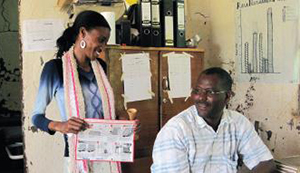PMI has supported the Health Extension Program since 2007 through the procurement of RDTs, antimalarial drugs, and long-lasting ITNs, and through support for IRS operations, HEW training, and iCCM.

A health extension worker shows a job aid about correct ITN hang-up and use to the district health officer at a health post in Oromia Regional State, Ethiopia. Source: Joe Malone/PMI
In 2004, Ethiopia’s Federal Ministry of Health launched the Health Extension Program, which extends primary health care beyond the district level, making it more accessible to the population in each municipality (kebele) of the country. At the core of the program are health extension workers (HEWs), who are primarily women. The U.S. President’s Emergency Plan for AIDS Relief, USAID’s Maternal and Child Health and Reproductive Health programs, and The Global Fund To Fight AIDS, Tuberculosis and Malaria supported the training and equipping of two HEWs for each rural village with a population of 5,000 or more. HEWs are implementing a package of 17 health services, including immunization, family planning, reproductive health, and malaria. HEWs are equipped with RDTs and antimalarial drugs to diagnose and treat malaria and also participate in ITN distribution campaigns and IRS operations at the community level.
PMI has supported the Health Extension Program since 2007 through the procurement of RDTs, antimalarial drugs, and long-lasting ITNs, and through support for IRS operations, HEW training, and iCCM. The establishment of the Health Extension Program has had a dramatic effect on improving malaria case management in Ethiopia by improving prompt access to malaria interventions and services among rural populations. According to the 2011 Demographic and Health Survey, all-cause under-five mortality has been reduced by 28 percent since 2005. The scale-up of the Health Extension Program and the construction and equipping of rural health care facilities have been among the most significant new public health interventions implemented in Ethiopia between 2005 and 2010.
